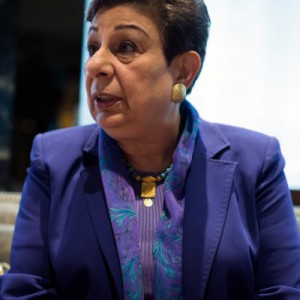Palestinian Leaders Seek Actions in Security Council and Court

UNITED NATIONS — Israel’s 50-day war with Palestinian militants in Gaza was a “game changer” that persuaded the Palestinian president, Mahmoud Abbas, to shelve the already moribund American-sponsored peace talks and decide to join the International Criminal Court, even if that meant defying the United States, a senior Palestinian leader said Tuesday.
“Because enough is enough, and what has the U.S. done for us?” Hanan Ashrawi, a member of the executive committee of the Palestine Liberation Organization, said in an interview during a visit to the United Nations.
Dr. Ashrawi’s visit was part of a new strategy by Mr. Abbas to put international pressure on Israel and to lift his government’s standing among Palestinians in the aftermath of the Gaza war. That strategy involves bringing a Security Council resolution this month that would demand an end to Israeli occupation within three years — a bid that Dr. Ashrawi said the United States was likely to block — as well as acceding to the treaty that created the International Criminal Court.
Continue reading the main story
Interactive Feature: Lines in the Sand
She was to meet with the American ambassador to the United Nations, Samantha Power, late Tuesday before heading to Washington, she said. The United States Mission declined to immediately comment.
Ever since Palestine won upgraded status at the United Nations in late 2012, over Israeli and American opposition, its government has threatened to join the international court as a way to prosecute Israeli actions in the occupied territories. But Mr. Abbas deferred a decision, Dr. Ashrawi said, in order to give American-led diplomacy a chance to succeed and to convince other Palestinian political factions, including the militants, that they would have more to gain than to lose from an international war crimes tribunal.
Joining the court means subjecting Palestinian factions, including Hamas, to its jurisdiction. Mr. Abbas, Dr. Ashrawi said, “wanted to ensure that all factions are O.K. with it.” She added, “He got, finally, the acceptance of all factions.”
The prospect of the Palestinians’ joining the court has caused deep concern in Israel and the United States because it is one of the only ways that the tribunal can bring war-crimes charges against Israelis. The court has jurisdiction only over member countries, or those referred by the Security Council; the United States would be highly unlikely to allow such a referral of Israel.
Ron Prosor, the Israeli envoy to the United Nations, denounced the Palestinians’ plan, saying: “Their habit of bypassing negotiations by taking unilateral action and blaming everyone but themselves will only move the region further away from stability. It’s time for the Palestinians to aim higher and find constructive solutions, instead of avoiding a real dialogue.”
American officials have continued to insist that an agreement must be reached directly between the parties involved, and not through a Security Council resolution. The United States also opposes a Palestinian initiative at the court.
Continue reading the main story
Continue reading the main story
The new diplomatic efforts by the Palestinians clearly have a domestic audience in mind. Dr. Ashrawi openly acknowledged that the Gaza war had significantly lifted the popularity of Hamas militants.
Dr. Ashrawi offered no time frame for how quickly the Palestinian efforts would bear fruit at the Security Council. Any effort toward a resolution with a specific deadline to end the Israeli occupation is likely to encounter stiff opposition from the United States, which wields a veto as a permanent member and is president of the council this month. Dr. Ashrawi shrugged off the possibility of an American veto, saying the Palestinians could also consider taking the issue to the General Assembly, where the Palestinian aspiration for statehood enjoys wide support.
Mr. Abbas is to speak to the annual session of the General Assembly, which starts later this month.
Dr. Ashrawi asserted that peace talks with Israel had been so frustrating that a shift in strategy was needed and expected by the Palestinian population, which has grown increasingly bitter and disappointed. She said the failed negotiations, which had been pushed aggressively by Secretary of State John Kerry, had basically allowed Israel to perpetuate policies long opposed by the Palestinian side.
Palestinian anger was reinforced on Sunday when the Israeli government seized nearly 1,000 acres in the West Bank, an action that drew widespread condemnation, including from the United States.
Mr. Abbas has advanced his new deadline strategy amid signs that his popularity as a Palestinian leader has faltered, in part because of the Gaza war.
A poll conducted by the Palestinian Center for Policy and Survey Research, released on Tuesday, showed that the popularity of Hamas and its armed-resistance approach toward Israel had increased among Palestinians in the West Bank and Gaza.
The poll suggested that Hamas would win elections if they were held today, and that more West Bank residents supported transferring the use of the Hamas method to the West Bank. It also showed that 86 percent of respondents supported the launching of rockets from Gaza into Israel if the economic blockade long imposed on Gaza was not lifted.
The Palestinian Center said the results were based on face-to-face interviews with 1,270 adults in the West Bank and Gaza, from Aug. 26 to 30, in 127 randomly selected locations. The margin of sampling error is plus or minus three percentage points.
To view the full story, please click here.